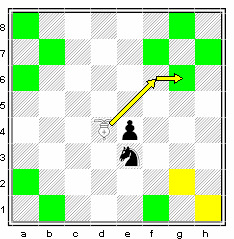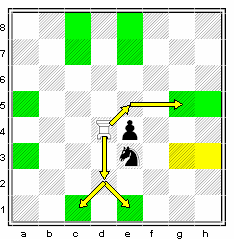ZigZag Madness
ZigZag Madness is a 10x10 board chess variant that features 2 new exotic pieces: the ZigZag Bishop and the ZigZag Rook, both of which are crooked dual path sliders. (or 2-path Bent Riders in more accurate CV terminology)The ZigZag Bishop controls all adjacent diagonals except adjacent squares and any square that is a knight's move away.
Similarly, the ZigZag Rook controls adjacent files and ranks with the same caveat.
Otherwise, the rules are exactly as in orthodox chess except for: Flexible castling (King can castle by moving 1, 2 or 3 (or 4 on Q-side) spaces towards rook, modified and faster movement of the standard pawns and associated extended en-passant rules.
Setup
 |
The board is set up as follows for the white side (black side will mirror this):
Rook on a1 Wazir Knight on b1 Bishop on c1 ZigZag Bishop on d1 Queen on e1 King on f1 ZigZag Rook on g1 Bishop on h1 Ferz Knight on i1 Rook on j1 10 pawns from a2 to j2. Note that the lower right square is white, and that kings occupy the same color square. 5 Ninja pawns to be dropped one per turn into empty space from a2-j2 |
Pieces
The ZigZag Bishop

 |
Both paths must be blocked for it not to be able to make it to the destination square. The pawn at e4 blocks one path to g6 and h7. The e4 pawn and the knight at e3 block both paths to g2 and h1 (the yellow squares). |
The ZigZag Rook


 |
Both paths must be blocked for it not to be able to make it to the destination square. The pawn at e4 blocks one path to g5 and h5 The e4 pawn and the knight at e3 blocks both paths to g3 and h3 (the yellow squares). |
The pawn can move from its original position either 1, 2 or 3 vacant squares forward.
If it previously moved only 1 space originally or captured from original position, it can move forward two spaces towards the center.
En-passant is logically applied to meet these changes.
From the middle (rank 5 for white, rank 6 for black), it can step only 1 space forward into the upper half of board, but from thereafter it can go one or two vacant spaces forward.
For example, a pawn can start at e2 push forward to e5 then make one step to e6 then go e8, and promote at e10 in 4 moves!
Note that if a pawn makes the two step pawn move and bypasses an enemy pawn, it can be captured en-passant.
The Ninja Pawn


Movement:
The ninja pawn can always move 1 square up or 1 square sideways
to an empty square regardless of where it is situated on the board.
Thus White can on each turn move from e2-e3, e3-d3 and d3-d5.
From the middle exactly, (rank 5 for white, rank 6 for black), the ninja pawn can move only 1 square forward, but thereafter as soon as it enters enemy territory (the upper half of the board: White rank 6-10, and for black rank 5 - 1), the pawn can go forward either 1 OR 2 empty spaces.
Capture:
Like the standard pawn it can capture one square diagonally up, regardless of which half of the board it is on.
When the ninja pawn is on the top half of board (White rank 6 +, Black rank 5-) , it can also capture one square horizontally.
There is no en passant. It cannot capture another pawn or ninja pawn en passant nor can any other pawn capture it this way.
Promotion:
The ninja pawn promotes on the last row (rank 10 for white, rank 1 for black), to any piece. Promotion to a piece is mandatory so it would cease to be a pawn
in the last row.
Note that like the standard pawn, it can reach the promotion square from its start position in a minimum of 4 moves!
It cannot make a capture on the same turn as the drop.
The Ferz-Knight - moves like a knight or makes one step diagonally.
The Wazir-Knight - moves like a knight or makes one step orthogonally.
Rules
Except for the movement of the new pieces and the standard pawns, the rules are exactly as in orthodox chess except for: Flexible castlingThe King has the option to castle by moving 1, 2 or 3 (or 4 on Q-side) spaces towards rook.
Notes
A tactical opening example|
1. d2-d5 d9-d6 2. c1-g5 i10-h8?! //ignoring the threat to the pawn 3. g5-c9 (bxp) //capturing the pawn |
3 .. d10-a6! //forking the bishop and the queen! Can you spot White's best move? |
|
 |
 |
|
| 4. d1-a5! //All is not lost! White might get away with the pawn!
The game might proceeed with 4... ~p-d9 //Black drops a ninja pawn to block the attack. 5. c9-b10 (bxwn) and White seems to have gained a pawn. |
ZigZag Madness is my last chess variant using this board size, and is closely related to the games: Asylum Redux and Octopus Chess.
Note: The ZigZag Bishop is not to be confused with the Boyscout which has a radically different moveset and which is occasionally referenced with the same name.
 This 'user submitted' page is a collaboration between the posting user and the Chess Variant Pages. Registered contributors to the Chess Variant Pages have the ability to post their own works, subject to review and editing by the Chess Variant Pages Editorial Staff.
This 'user submitted' page is a collaboration between the posting user and the Chess Variant Pages. Registered contributors to the Chess Variant Pages have the ability to post their own works, subject to review and editing by the Chess Variant Pages Editorial Staff.
By Charles Daniel.
Web page created: 2008-11-19. Web page last updated: 2008-11-19
